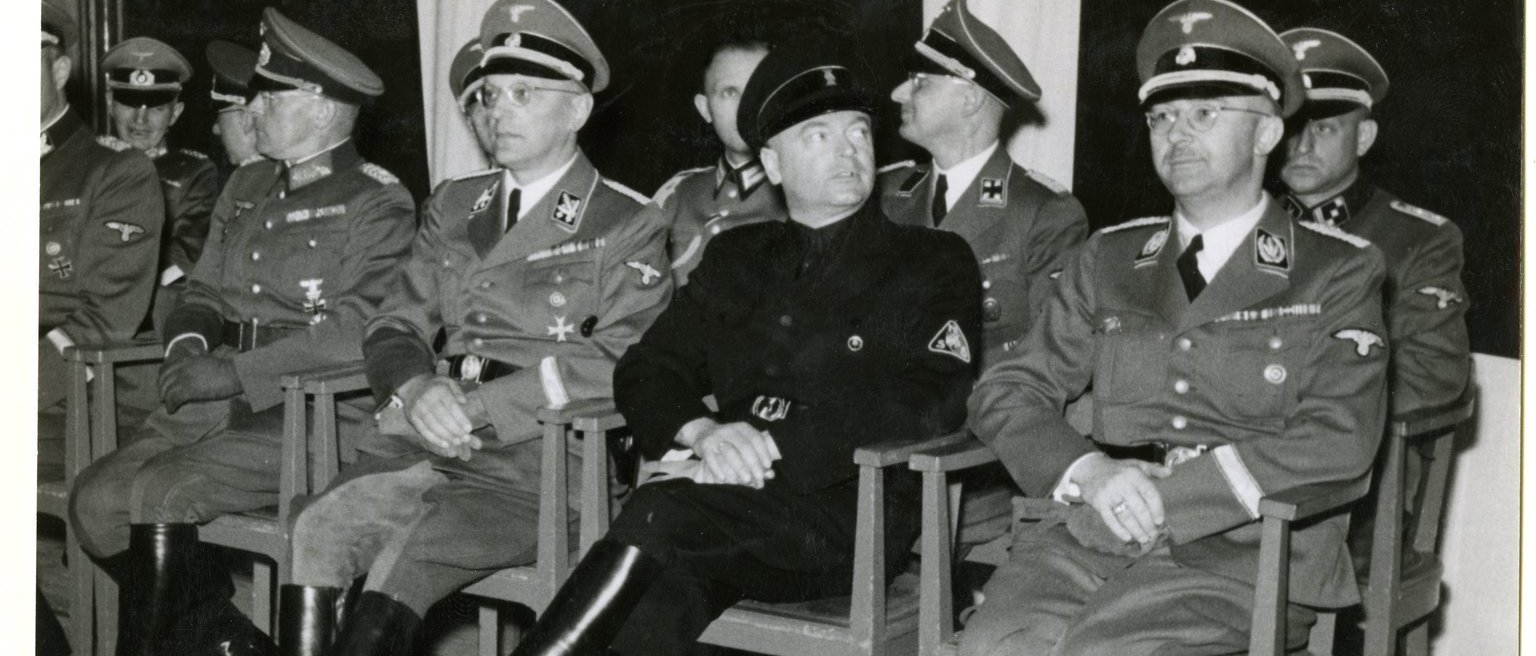Anton Mussert: Hitler's Quisling
Posted on 23rd August 2021
Anton Adriaan Mussert considered himself a Dutch nationalist and patriot, but he was to act against his own inclinations and betray his country and the people he had sworn to protect.
He was born on 11 May 1894, in the small town of Werkedam in rural North Brabant where his father was Headmaster of the local school, and he grew up wanting to be a soldier but failed the medical and was bitterly disappointed when the Netherlands chose to remain neutral during the Great War.
With his ambition to be a war hero thwarted he decided to indulge his love of technology and all things mechanical studying civil engineering at the University of Delft. Following graduation, he worked for Utrecht District Council in the Department of Waterways and Public Works.
From an early age he had displayed an interest in politics particularly that of the far-right and he was a great admirer of Mussolini whose fascist ideology, corporate vision and indeed mannerisms he would later adopt. During the 1920's he was active in the Dietsche Bund an organisation committed to incorporating Belgian Flanders into a Greater Netherlands, but he remained very much on the fringe of politics and very much frustrated that his voice was not being heard.
On 14 December 1931, he was one of the founding members and soon after appointed leader of the Nationaal Socialitsche Beweging or N.S.B. They professed to be strong supporters of the Dutch Reformed Church, campaigned for a return to traditional values, sought to expand Dutch national territory and spoke often of the mystical bond of blood and soil - Mussert had found his spiritual and political home.
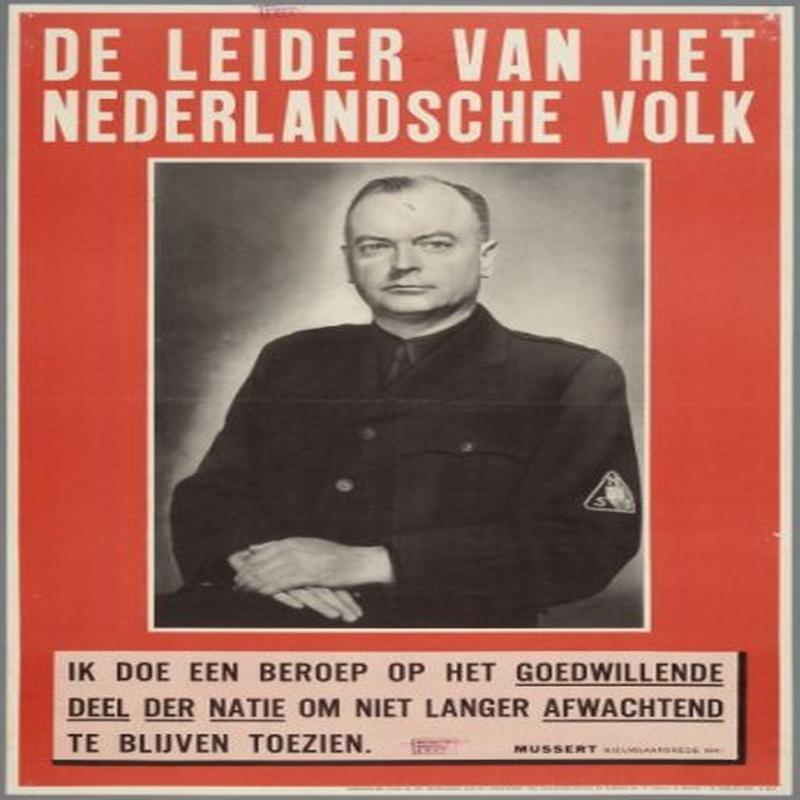
The Party struggled for support in a country where political extremism remained very much on the margins and in the first two years of its existence it rarely attracted more than 500 supporters to its rallies.
The Netherlands like every other country in Europe had suffered terribly during the Great Depression however, and in times of social distress people seek solutions and even in a country renowned for its tolerance the Dutch people were to prove just as vulnerable to the fascist ideology that was sweeping the Continent as anyone else.
By 1934, it was attracting 25,000 supporters to its Annual Rally in Amsterdam.
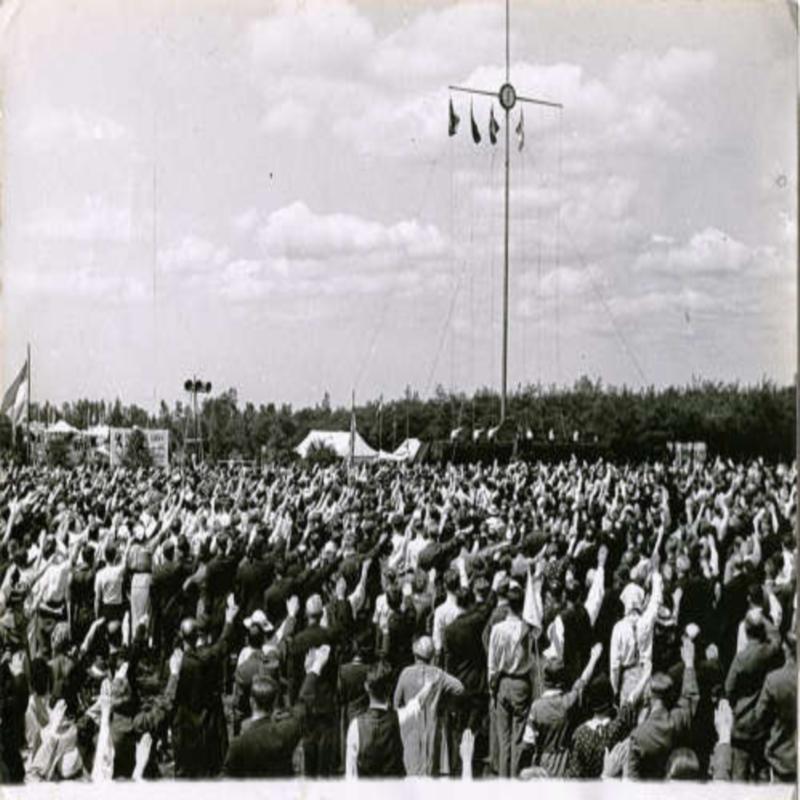
In the Election of 1935, it polled more than 300,000, mostly rural votes or 8% of the total, and it could also boast more than 50,000 members but this was to be the high-water mark of its support.
The N.S.B preached a doctrine of intolerance that did not sit easily with most Dutch people and by 1937 with the country beginning to recover from the worst economic recession in its history its support had more than halved; with no serious prospect of ever being elected to power Mussert was willing to consider other means and he began to work covertly towards a German invasion of his country and issued instructions to N.S.B members not to resist any German incursion into Dutch territory.
He also conspired with German Military Intelligence to kidnap Queen Wilhelmina in the hope that they would then install him as Head of State, but the plot was foiled and the man with ambitions to be Die Leider was forced into hiding and so was unable to influence events when the actual invasion came.
At 03.55 on 10 May 1940, German forces invaded the Netherlands but despite being hopelessly outgunned and incompetently led the Dutch Army fought back. The many inland waterways that traversed Holland made it difficult terrain for the German Army but their plan for victory in the West reliant as it was upon the tactic of blitzkrieg required the swift elimination of both Holland and Belgium.
Surprised at the level of Dutch resistance and concerned by any delay to their plans they decided to terrorise the Dutch Government into submission. On 14 May, they bombed Rotterdam utterly destroying the docks and the city centre and causing more than 20,000 casualties. Fearing that the same would now happen to Amsterdam and elsewhere and with no effective Air Force of its own the Dutch Government ordered a cessation of hostilities.
Four days of fighting had left 2,332 Dutch and 2,700 German soldiers dead with a further 17,000 wounded. But emerging from his bolthole at least one man was happy.
By the time of the German invasion support for the N.S.B had been reduced to little more than a rump, but this didn't stop Mussert from declaring himself as the man who could rally the Dutch people behind their new German allies.
The Germans were at best sceptical, they were aware that his Party had made few in-roads in the major cities, that he had adopted no racial doctrine of his own and had once boasted that his Party had hundreds of Jewish members. He had only introduced a racial element into the Party Platform under pressure from the more extreme wing of his Party, the so-called Volksen. But Hitler needed a Dutch figurehead, one with a public profile who could be easily manipulated and would remain subservient and Mussert fitted the bill.
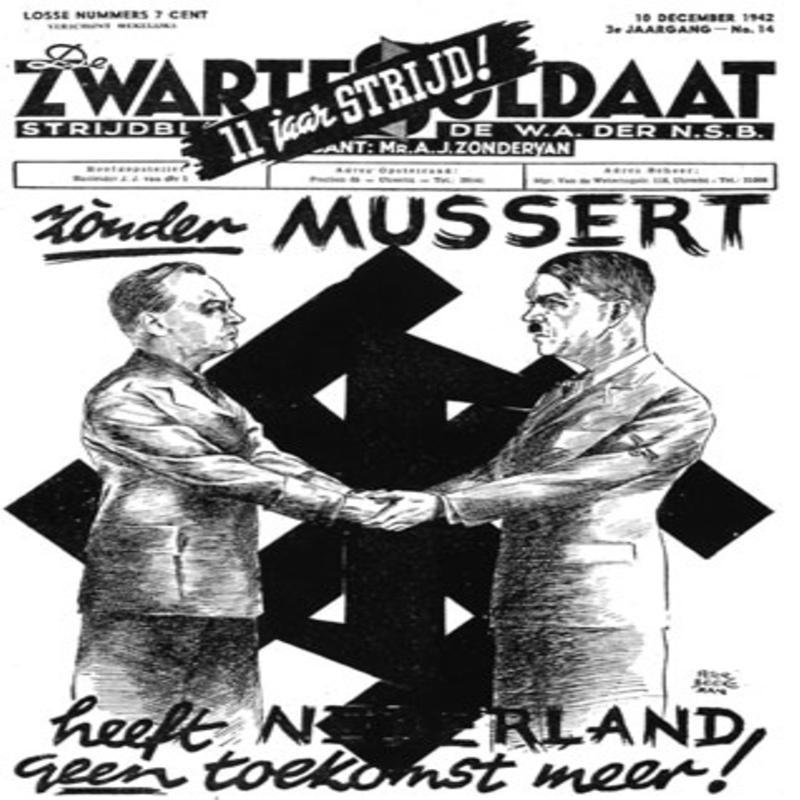
On 23 September 1940, Mussert met Adolf Hitler in Berlin and he had big plans. He suggested that the borders of the Netherlands be expanded to include Belgium Flanders and that a League of Nordic Nations should be created with Hitler at its head but with each having its own Leader subordinate to the Fuhrer. He of course would be leader of the Netherlands. Indeed, he was even willing to accept the post of Deputy Fuhrer of the Reich should it become available. Hitler did not dismiss his ideas out of hand and Mussert was treated cordially and with respect, for now at least.
He was flattered by the Germans apparent interest in him and believed in their talk of him being the Dutch saviour but as he was to soon find out he would have no real power. That would lie in the hands of the German Governor of the Netherlands, Artur Seyss-Inquart. Even so, Mussert was eager to play his part and begin implementing those policies he had long campaigned for.
His illusions were shattered however when he learned he was to have no independence whatsoever and was only required to do Seyss-Inquart's dirty work. He was further disappointed when told that that there was to be no expansion of the Netherlands instead his country would merely be incorporated into a Greater Germany.
Many in the Nazi hierarchy had expected the Dutch to be their natural allies but they were to prove surprisingly attached to their Royal Family and resistant to Nazi policies. On Prince Bernhard's birthday many people wore orange carnations in recognition and letters were stamped on the wrong side so that the place reserved for Queen Wilhelmina's image was left blank. Small acts of defiance perhaps but it fell to Mussert to bring his unruly countrymen into line and this he failed to do.
When Dutch Civil Servants objected at having to mark all citizens identity cards as either Jew or non-Jew it was Mussert who ordered them to remain at their posts and do their duty. Most did but it was out of a fear of losing their jobs or worse not out of any respect for, Anton Mussert.
In response to the anti-Jewish clampdown on 25 February 1941, workers in Amsterdam went on strike and took to the streets. It was to be the only pro-Jewish demonstration in Occupied Europe and the Germans were outraged, nine demonstrators were killed and fearing a bloodbath the strike was called off forty-eight hours later. But the fact it had been allowed to occur at all greatly concerned the Germans and if Mussert was too weak to assert his authority then there were others in the Netherlands who would.
One such man was Meinoud Rost van Tonningen, a financier and unlike Mussert a vicious anti-Semite who was so devoted to Nazi Germany that he favoured the Netherlands ceasing to exist as a national entity and even wished to subordinate the Dutch language to German leading to its eventual extinction.
Mussert, who knew he could easily be replaced was afraid of Tonningen's influence with the Nazi's and so to ingratiate himself with Hitler he led a campaign to encourage all able-bodied young Dutchmen to enlist in the Nederlandische SS and other such Nazi formations and some 50,000 would eventually do so, more than any other country under German occupation. He viewed this as his personal contribution to the German war effort even ordering members of the N.S.B and the so-called Mussert Guard to do so.
If he thought this would restore his credibility with the Germans, he was mistaken. The new Dutch military formations were not to swear an oath of allegiance to Mussert but to Adolf Hitler personally while the Guard that carried his name was removed from his control and placed under the command of Tonningen.
Mussert had promised to both protect the Dutch people and to re-educate them in Nazi values and ideology but had failed to do either. The Germans no longer had any faith in him, but they were happy for him to be the public face of the Nazi Netherlands and its worst excesses and so for his loyalty in December 1942 he was awarded in a ceremony attended by Adolf Hitler the title of Fuhrer of the Dutch People.
He thought it made him a great man, but it did not. Indeed, Seyss-Inquart, despite ignoring his suggestions, flattered him into believing that he remained invaluable.
As much out of fear as anything membership of the N.S.B had risen following the German invasion with many people afraid that they would either lose their jobs or be singled out punishment if they were not members. Even so, it never rose above 2% of the population but like so many others Mussert convinced himself that any increase in membership reflected his own popularity. He ignored the fact that over the next few months Party subscriptions were not paid and thousands of memberships lapsed never to be renewed.
Mussert's failure to fully embrace anti-Semitism created a vacuum which others were willing to fill men like Wim Henneicke who along with eighteen other N.S.B members formed the so-called Henneicke Column serving as bounty hunters for the Nazi's bullying people to reveal the whereabouts of Jews whose property they stole before selling them off to the Nazi's for the price of 7.5 guilders each (about £30). They were to be responsible for rounding up some 9,000 Jews, many of them children.
Henneicke's behaviour outraged many and in response the Dutch were to hide more than 25,000 Jews in their own homes. It also made the N.S.B. and Mussert hated but he did nothing and remained silent. The Dutch Resistance however did not, and they began assassinating leading N.S.B members and more than a 100 would be killed including in December 1944, Wim Henneicke.
The Germans carried out reprisals but so too did the N.S.B and units of the Mussert Guard under the command of Hendrick Feldmeyer murdered 54 known opponents of the regime. Mussert was appalled that his personal bodyguard were killing their fellow Dutchmen and he expelled Feldman from the party, but this was to be a rare assertion of authority.
In the summer of 1943, all those Dutch soldiers who had been captured during the brief war and since released were ordered to re-enlist and be incorporated into the German Army. Many went into hiding and once more Dutch workers downed tools and went on strike in protest. The Nazi's were again swift to respond shooting dead nineteen hostages in reprisal.
Mussert who had not been informed of the Nazi's intentions said nothing. Neither did he protest when tens of thousands of Dutch men and women were rounded up and sent to Germany as forced labour.
In December, he requested a meeting with Adolf Hitler to seek clarification of his position. This time their meeting was not so cordial and his repeated suggestion that a Nordic League be created was dismissed out of hand. In fact, Hitler told him in no uncertain terms that he would never have political power.
Despite being little more than a puppet, he remained committed to the German occupation of his country and to prove his commitment he began to actively participate in the round-up and deportation of Dutch Jews to the Concentration Camps in the East. He also willingly signed the death-warrants of those Dutch Resistance Fighters who were captured.
By the autumn of 1944 it was evident to many that Germany had lost the war but not to Anton Mussert who continued to work tirelessly in the Nazi cause. Still, he considered himself a Dutch patriot though how this corresponds to working in the service of an occupying power never seemed to dawn on him.
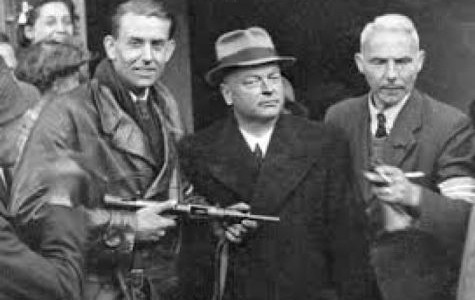
Following Germany's defeat, he made no attempt to flee Holland believing that he had done no wrong. It took little time for the new Dutch Government to come for him.
On 7 May, 1945, he was arrested at the N.S. B’s Headquarters in The Hague and put on trial for treason. On 28 November, after a trial lasting barely two days, he was found guilty and sentenced to death.
His pleas to Queen Wilhelmina for clemency on the grounds that he was a patriot and had done his best to protect the Dutch people from the worst excesses of Nazi tyranny were ignored.
The truth was he had been a willing accomplice to the German invasion and occupation of the country he professed to love.
Anton Mussert was executed by firing squad on 7 May 1946.
Tagged as: Modern
Share this post:





